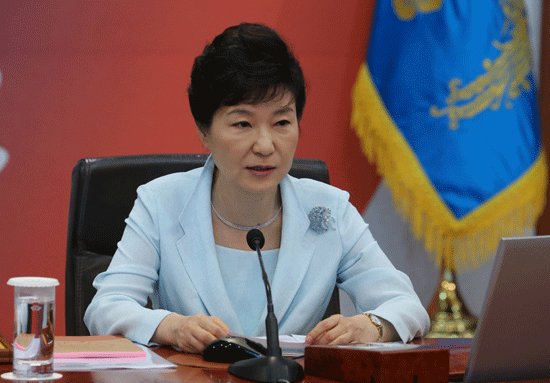President Park Geun-hye said Tuesday that South and North Korea can move toward peace and unification if they honor a recent deal that defused tensions.
The deal reached last week between the two Koreas after days of marathon negotiations set the stage for inter-Korean dialogue and reunions of families separated since the 1950-53 Korean War.

The two Koreas are set to hold Red Cross talks on Sept. 7 to arrange the reunions around Chuseok, a major holiday that is celebrated in both Koreas and falls on Sept. 27.
"We can move toward the path of cooperation for peace and unification on the Korean Peninsula if we implement this hard-won agreement well," Park said in a Cabinet meeting.
She also expressed hope that the two Koreas can stage the upcoming reunions without a hitch to ensure separated family members can resolve their deep sorrows.
Hundreds of thousands of Koreans have been separated since the Korean War, which ended in an armistice, not a peace treaty.
Family reunions are a pressing humanitarian issue on the divided peninsula, as most separated family members are in their 70s and 80s, and wish to see their long-lost relatives before they die.
Park said the upcoming reunions can open the path through which separated family members of the two Koreas can meet, in an apparent reference to regular reunions.
Last week, the two Koreas agreed to hold reunions of separated families in the future.
Park also renewed calls for efforts to revive South Korea's faltering economy and to reform the labor sector.
"It is our responsibility to create decent jobs for our young people," Park said.
Data showed the unemployment rate for people between the ages of 15 to 29 reached 9.4 percent in July, compared with the 3.7 percent average for the country as a whole.
She warned that everybody would stand to lose unless labor reform is made, noting that labor reform is a public demand that no one can defy.
Businesses and the government have called for greater flexibility in the hiring and firing of workers to cope with labor market duality -- the difference in pay and job security between regular and non-regular workers.
South Korea's labor unions have argued that more must be done to reduce the number of irregular workers instead of just striving to weaken the job security of regular workers.
Park told officials to ensure all public companies will introduce a wage peak system by the end of the year, calling it "a must, not a choice," according to presidential spokesman Min Kyung-wook.
The system is meant to provide job security for older employees through a gradual reduction in wages after a certain age. The money saved can be used to hire more young people.
South Korea is set to raise the retirement age of workers in January to 60 from 58, a move that experts say could make companies hold off hiring new workers. (Yonhap)









![[Hello India] Hyundai Motor vows to boost 'clean mobility' in India](http://res.heraldm.com/phpwas/restmb_idxmake.php?idx=644&simg=/content/image/2024/04/25/20240425050672_0.jpg&u=)









